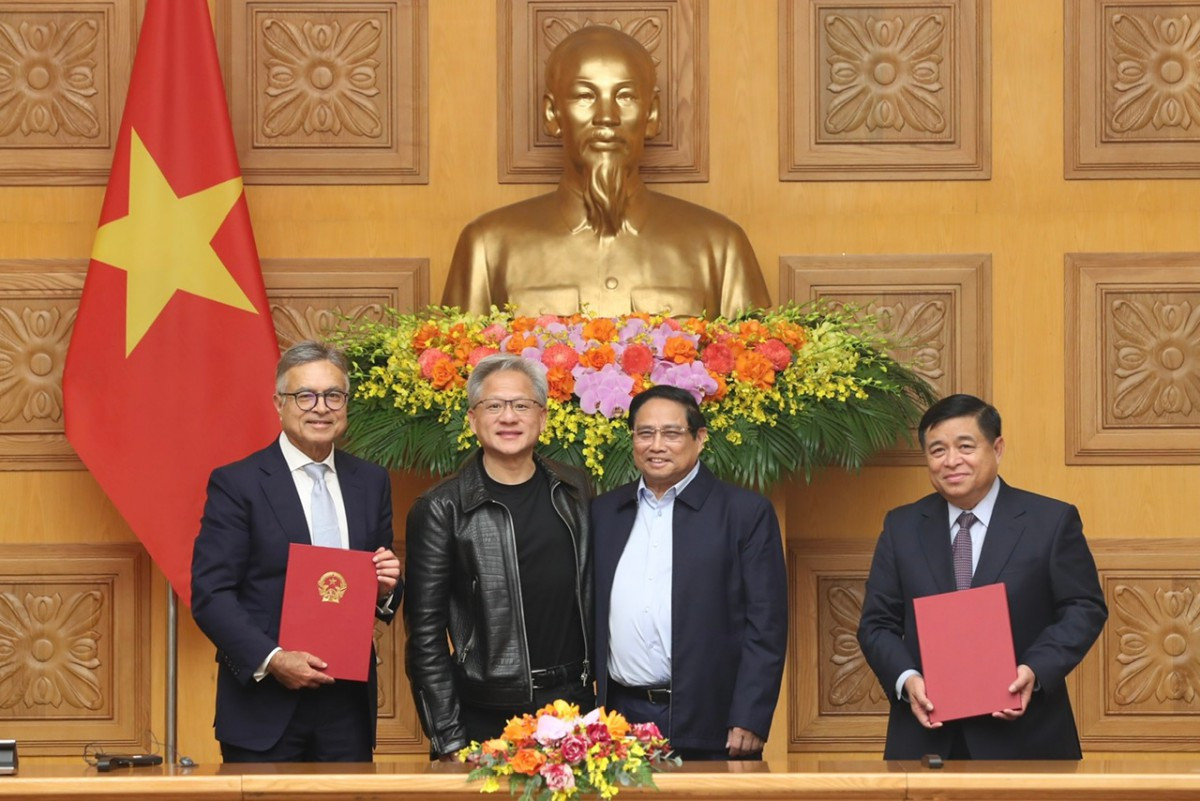
Prime Minister Pham Minh Chinh and NVIDIA CEO Jensen Huang witness the signing of an agreement to establish an AI research and development center in Vietnam. Photo: NIC
The widespread adoption of artificial intelligence (AI) promises to be a significant catalyst for Vietnam’s digital transformation and economic growth, positioning the country as a rising player in the AI ecosystem.
The growing impact of AI in Vietnam
AI has increasingly proven its transformative potential in Vietnam, influencing key sectors like public services, agriculture, and more.
In 2022, the Supreme People’s Court introduced an AI-powered legal assistant to reduce the workload of judges. By mid-2024, the platform had integrated over 173,000 legal documents, 27,000 legal queries, and 1.4 million court rulings. Judges and the AI assistant interact an average of 10,000–15,000 times daily.
By 2025, this legal assistant will be publicly accessible, offering a cost-effective tool for legal education and assistance to the broader community.
In agriculture, the International Rice Research Institute (IRRI) has leveraged AI to develop climate-resilient rice varieties, helping Vietnamese farmers better adapt to climate change.
A report commissioned by Google estimated that by 2030, businesses across six Southeast Asian economies, including Vietnam, could reap up to $835 billion in economic benefits by adopting AI-powered solutions.
Vietnam’s advantages in AI development
Vietnam holds significant potential to become a leader in AI adoption. With a young population - 75% under 35 years old - and an Internet penetration rate of approximately 80%, the nation is well-positioned for rapid digital adoption.
Vietnam is also ranked second in Southeast Asia for its AI startup ecosystem, capturing 27% of the region's AI startups, trailing only Singapore (44%) and far ahead of Indonesia and Thailand.
Do Tien Thinh, Deputy Director of the National Innovation Center (NIC), highlighted that Vietnam’s strengths in sectors such as agriculture, food production, education, and consumer goods make it an ideal candidate for AI integration.
AI adoption could enhance the competitiveness of Vietnamese enterprises while improving productivity in the public sector. However, achieving this potential requires a comprehensive, long-term strategy.
Strategies for AI leadership
To develop a robust AI ecosystem, Vietnam must prioritize its application in public services. Currently, many critical systems in taxation, customs, environmental management, and urban planning lack AI integration.
Data sharing between the public and private sectors is another critical area requiring attention. Vietnam also needs a dedicated national AI steering committee to oversee and guide its AI development efforts.
According to Arnaud Ginolin, Managing Director at Boston Consulting Group, the global market for AI applications in the public sector is expected to reach $1.75 trillion by 2030. AI-powered tools, such as virtual assistants, can significantly improve public services, support internal government operations, and assist in policy planning.
Ginolin emphasized that governments should define clear short-, medium-, and long-term strategies for AI, identifying specific use cases and starting with small-scale implementations before scaling up successful initiatives.
By addressing these challenges and leveraging its strengths, Vietnam has the opportunity to become a regional AI leader, driving digital transformation and sustainable economic growth.
Van Anh